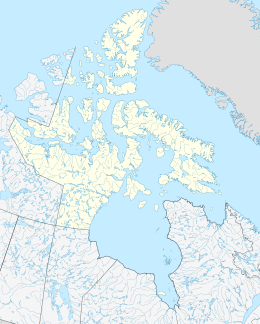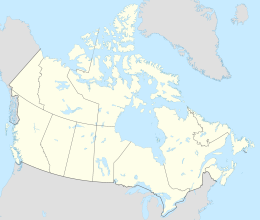Igloolik Island is a small island in the Qikiqtaaluk Region of Nunavut, Canada. It is located in the Foxe Basin, very close to the Melville Peninsula (and to a lesser degree, Baffin Island), and it is often thought to be a part of the peninsula. It forms part of the Arctic Archipelago.
 Remnants of older Inuit sod houses in Igloolik Point | |
| Geography | |
|---|---|
| Location | Foxe Basin |
| Coordinates | 69°23′N 81°40′W / 69.383°N 81.667°W[1] |
| Archipelago | Arctic Archipelago |
| Administration | |
Canada | |
| Nunavut | Nunavut |
| Region | Qikiqtaaluk |
| Largest settlement | Igloolik |
| Demographics | |
| Population | 1,538 |
| Ethnic groups | Inuit |
The word Igloolik (Inuktitut: "there is an igloo here") comes from iglu (meaning: "house"/"building") and refers to the sod houses (qarmaq)[2] that were originally in the area.[3][4] Inuit and their ancestors have inhabited the island since 2000 BC. The archaeological sites on the island, which show a sequence up to 1000 AD, were designated a National Historic Site of Canada in 1978.[5][6]
There is only one community on the island, also named Igloolik.
Qikiqtaarjuk
editOn the north of Igloolik Island at 69°24′45″N 081°30′07″W / 69.41250°N 81.50194°W is a peninsula called Qikiqtaarjuk (Inuktitut syllabics: ᕿᑭᖅᑖᕐᔪᒃ,[7] English: little island).[8][9] About 400 – 500 years ago Qikiqtaarjuk was a separate island but due to isostatic rebound it became part of the main island.[8] Inuit Qaujimajatuqangit (traditional knowledge) says that prior to that there was an even smaller island called Puqtuniq from which the waters receded forming Qikiqtaarjuk.[10] Qikiqtaarjuk is associated with several Inuit legends and stories and was the place from where Atanarjuat starts his run.[8][9][10]
Climate
editIgloolik has a polar climate (ET) with nine months averaging below 0 °C (32 °F). Winters are long and cold, with October being the snowiest month. Summers range from chilly to sometimes mild, with cold nights.
| Climate data for Igloolik (Igloolik Airport) Climate ID: 2402543; coordinates 69°22′N 81°49′W / 69.367°N 81.817°W; elevation: 52.7 m (173 ft); 1991–2020 normals | |||||||||||||
|---|---|---|---|---|---|---|---|---|---|---|---|---|---|
| Month | Jan | Feb | Mar | Apr | May | Jun | Jul | Aug | Sep | Oct | Nov | Dec | Year |
| Record high humidex | −4.2 | −0.6 | −3.9 | 0.3 | 5.6 | 18.7 | 24.3 | 24.5 | 11.2 | 3.4 | −0.5 | −1.5 | 24.5 |
| Record high °C (°F) | −1.0 (30.2) |
−1.0 (30.2) |
−3.0 (26.6) |
1.5 (34.7) |
7.0 (44.6) |
19.0 (66.2) |
24.5 (76.1) |
25.0 (77.0) |
15.0 (59.0) |
5.0 (41.0) |
−0.5 (31.1) |
−1.5 (29.3) |
25.0 (77.0) |
| Mean daily maximum °C (°F) | −27.6 (−17.7) |
−27.8 (−18.0) |
−23.8 (−10.8) |
−14.3 (6.3) |
−4.5 (23.9) |
4.1 (39.4) |
11.7 (53.1) |
8.8 (47.8) |
1.8 (35.2) |
−4.6 (23.7) |
−15.0 (5.0) |
−21.6 (−6.9) |
−9.4 (15.1) |
| Daily mean °C (°F) | −30.9 (−23.6) |
−31.0 (−23.8) |
−27.7 (−17.9) |
−18.4 (−1.1) |
−7.8 (18.0) |
1.6 (34.9) |
7.9 (46.2) |
5.8 (42.4) |
0.0 (32.0) |
−6.8 (19.8) |
−18.4 (−1.1) |
−25.4 (−13.7) |
−12.6 (9.3) |
| Mean daily minimum °C (°F) | −34.1 (−29.4) |
−34.2 (−29.6) |
−31.3 (−24.3) |
−22.6 (−8.7) |
−11.3 (11.7) |
−0.9 (30.4) |
4.0 (39.2) |
2.7 (36.9) |
−1.9 (28.6) |
−9.1 (15.6) |
−21.7 (−7.1) |
−29.0 (−20.2) |
−15.8 (3.6) |
| Record low °C (°F) | −45.0 (−49.0) |
−45.5 (−49.9) |
−47.0 (−52.6) |
−37.5 (−35.5) |
−28.0 (−18.4) |
−13.5 (7.7) |
−1.0 (30.2) |
−5.5 (22.1) |
−11.0 (12.2) |
−22.5 (−8.5) |
−36.0 (−32.8) |
−42.5 (−44.5) |
−47.0 (−52.6) |
| Record low wind chill | −61.0 | −66 | −58 | −49 | −35 | −21 | −4 | −11 | −18 | −50 | −50 | −56 | −66 |
| Average precipitation mm (inches) | 6.6 (0.26) |
7.1 (0.28) |
13.4 (0.53) |
17.0 (0.67) |
15.2 (0.60) |
16.5 (0.65) |
25.7 (1.01) |
34.9 (1.37) |
27.6 (1.09) |
35.0 (1.38) |
18.5 (0.73) |
11.5 (0.45) |
228.9 (9.01) |
| Average rainfall mm (inches) | 0.0 (0.0) |
0.0 (0.0) |
0.0 (0.0) |
0.1 (0.00) |
0.2 (0.01) |
12.8 (0.50) |
25.7 (1.01) |
32.2 (1.27) |
17 (0.7) |
1.3 (0.05) |
0.0 (0.0) |
0.0 (0.0) |
89.2 (3.51) |
| Average snowfall cm (inches) | 6.6 (2.6) |
7.2 (2.8) |
14.0 (5.5) |
17.5 (6.9) |
15.3 (6.0) |
3.8 (1.5) |
0.0 (0.0) |
2.7 (1.1) |
11.7 (4.6) |
33.4 (13.1) |
18.5 (7.3) |
11.6 (4.6) |
142.2 (56.0) |
| Average precipitation days (≥ 0.2 mm) | 4.2 | 4.4 | 6.6 | 7.3 | 6.7 | 7.2 | 9.3 | 10.4 | 9.5 | 11.6 | 7.9 | 6.3 | 91.4 |
| Average rainy days (≥ 0.2 mm) | 0.0 | 0.0 | 0.0 | 0.11 | 0.11 | 5.6 | 9.3 | 9.9 | 5.9 | 0.42 | 0.0 | 0.0 | 31.4 |
| Average snowy days (≥ 0.2 cm) | 4.4 | 4.4 | 6.6 | 7.2 | 6.6 | 1.7 | 0.0 | 0.59 | 4.5 | 10.8 | 7.7 | 6.2 | 60.7 |
| Average relative humidity (%) (at 1500 LST) | 73.3 | 80.5 | 73.2 | — | — | 79.8 | — | — | — | — | 81.4 | 78.6 | — |
| Source: Environment and Climate Change Canada Canadian Climate Normals 1991–2020[11] (Humidex, wind chill, and humidity from Canadian Climate Normals 1981–2010)[12] | |||||||||||||
See also
edit- Arvia'juaq and Qikiqtaarjuk National Historic Site, near Arviat in Nunavut formerly, an island but Qikiqtaarjuk is now part of the mainland
- Qikiqtaarjuk
References
edit- ^ "Igloolik Island". Geographical Names Data Base. Natural Resources Canada.
- ^ Irniq, Peter (February 2009). Joe Kremmidjuar Testimony. Isuma. Archived from the original on 2012-03-01. Retrieved 2009-12-23.
- ^ "Igloolik, Nunavut". Archived from the original on 2012-11-13. Retrieved 2009-03-28.
- ^ "Igloolik". Qikiqtani Inuit Association. 2007. Archived from the original on 2010-07-06.
- ^ Igloolik Island Archaeological Sites National Historic Site of Canada. Canadian Register of Historic Places. Retrieved 29 October 2013.
- ^ Igloolik Island Archaeological Sites National Historic Site of Canada. Directory of Federal Heritage Designations. Parks Canada.
- ^ "Qikiqtaarjuk". Geographical Names Data Base. Natural Resources Canada.
- ^ a b c Eber, Dorothy Harley (2008). Encounters on the Passage: Inuit Meet the Explorers. University of Toronto Press. ISBN 978-0-8020-9275-5.
- ^ a b Aporta, Claudio (December 2003). "New Ways of Mapping: Using GPS Mapping Software to Plot Place Names and Trails in Igloolik (Nunavut)" (PDF). Arctic. 56 (4): 321–327. doi:10.14430/arctic629.
- ^ a b Kublu, Alexina (1999). "Interviewing Inuit Elders". Nunavut Arctic College. Archived from the original on 2012-02-08.
- ^ "Igloolik A". Canadian Climate Normals 1991–2020. Environment and Climate Change Canada. 2024-10-01. Climate ID: 2402543. Retrieved 2025-01-13.
- ^ "Igloolik A". Canadian Climate Normals 1981–2010. Environment and Climate Change Canada. 2024-10-01. Climate ID: 2402543. Retrieved 2025-01-13.

